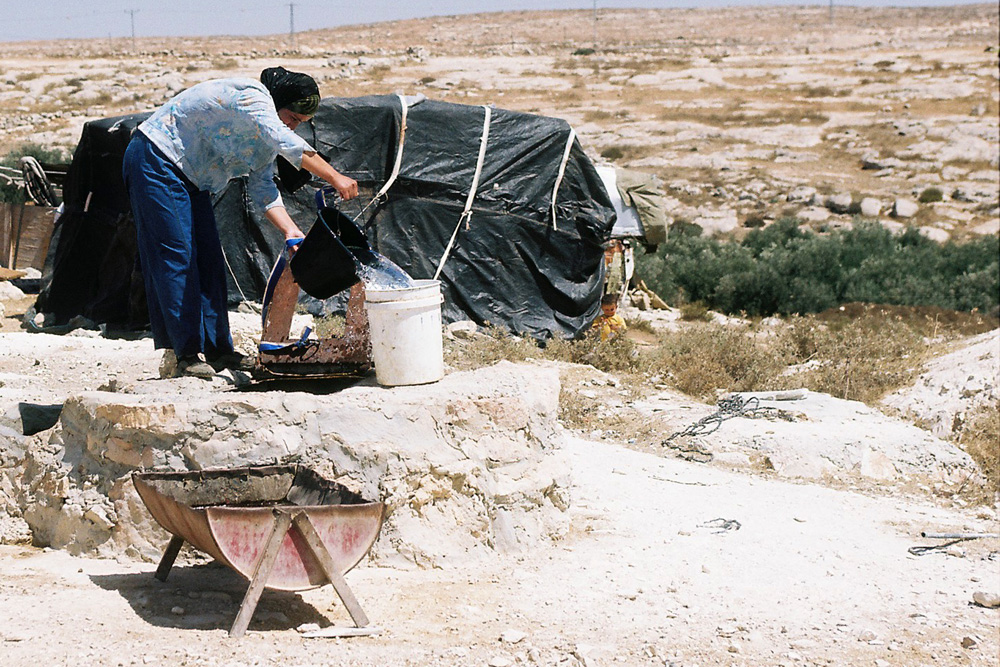Palestinians in the West Bank consume far less water than people in Israel, but they are likely to face a shortage this summer, the Israeli human rights group B'tselem has warned.
"The chronic water shortage results in large part from Israel's discriminatory policy in distributing the joint water resources in the West Bank, and the limits it places on the Palestinian Authority's ability to drill new wells," B'tselem said in a new position paper.
"The average water consumption per capita of Israelis is 3.5 times that of Palestinians," B'tselem said, adding "access to water without discrimination is recognised by international law as a fundamental human right."
Palestinians consume about 66 litres per capita per day, though in some areas that amount can drop by two-thirds.
Israel tends to cut the amount to Palestinians during the summer months, the paper said, in order to supply the needs of Israeli settlers. According to most experts, international law bans Israel's settlements, though the Jewish state does not accept this opinion.
The situation is being exacerbated by a very dry winter, which is the region's rainy season. Only about 64 percent of the average amount of rain fell this year in the northern West Bank, while in the south it was 55 percent. Experts have warned of the need to conserve water.
The Palestinian Water Authority reckons it lacks up to 70 million cubic metres of water to meet the needs of the 2.2 million people in the West Bank and has asked Israel's national water authority Mekorot to provide emergency assistance.
Mekorot
Dani Sofer, from Mekorot, told IRIN that while his organisation "is looking favourably at the request", technical problems might get in the way.
 Photo: Shabtai Gold/IRIN  |
| The structure on top of this cistern, which protected the water inside, was destroyed by the Israeli military as it said the West Bank villagers lacked a building permit. Since then, the cistern is no longer used as the water gets dirty |
"They really don't have enough water to drink," he said, noting that already Mekorot was supplying about 50 million cubic metres - more than it was required to under the Oslo Accords.
Critics of those agreements from the 1990s said they did not take all the Palestinians' needs into consideration.
Israel controls almost all the water in the Palestinian territory, and pumps more out of the West Bank for its own use than the total amount it allocates to the Palestinians, B'tselem said.
The few drilling projects the Palestinians had been allowed to attempt had failed due to a lack of resources and expertise, according to Israeli water experts. A recent successful water project in the West Bank town of Samua, was very much a one-off.
"Heavy economic burden"
Over 220,000 Palestinians in the West Bank live in villages not connected to a water network and an additional 190,000 have a very limited connection, forcing them to buy water specially tankered in at 3-6 times the price of normal water, B’tselem said.
"Due to the high unemployment and poverty rates in the West Bank, the expenditure on water has become a heavy economic burden on a significant section of the population," it added.
 Photo: Shabtai Gold/IRIN  |
| Palestinians in Samua, like other places in the West Bank, store water on their roofs. The water is tanked into an underground cistern and then pumped to the roof |
Geography and economics also play a role. While Israel is moving in the direction of relying more and more on desalination plants as part of a national plan to fight recurring drought, Palestinians in the West Bank have no access to the sea. An idea was floated to have a desalination plant at Hadera in central Israel which would connect to Palestinian territory, but it would have been costly, and so far no money for the project has been forthcoming.
Compounding the shortages is the fact that most Palestinian wastewater remains untreated, damaging aquifers and not allowing reuse.
Mekorot said the number of illegal Palestinian hook-ups in some places was causing large amounts of water to go to waste.
shg/at/cb
This article was produced by IRIN News while it was part of the United Nations Office for the Coordination of Humanitarian Affairs. Please send queries on copyright or liability to the UN. For more information: https://shop.un.org/rights-permissions





